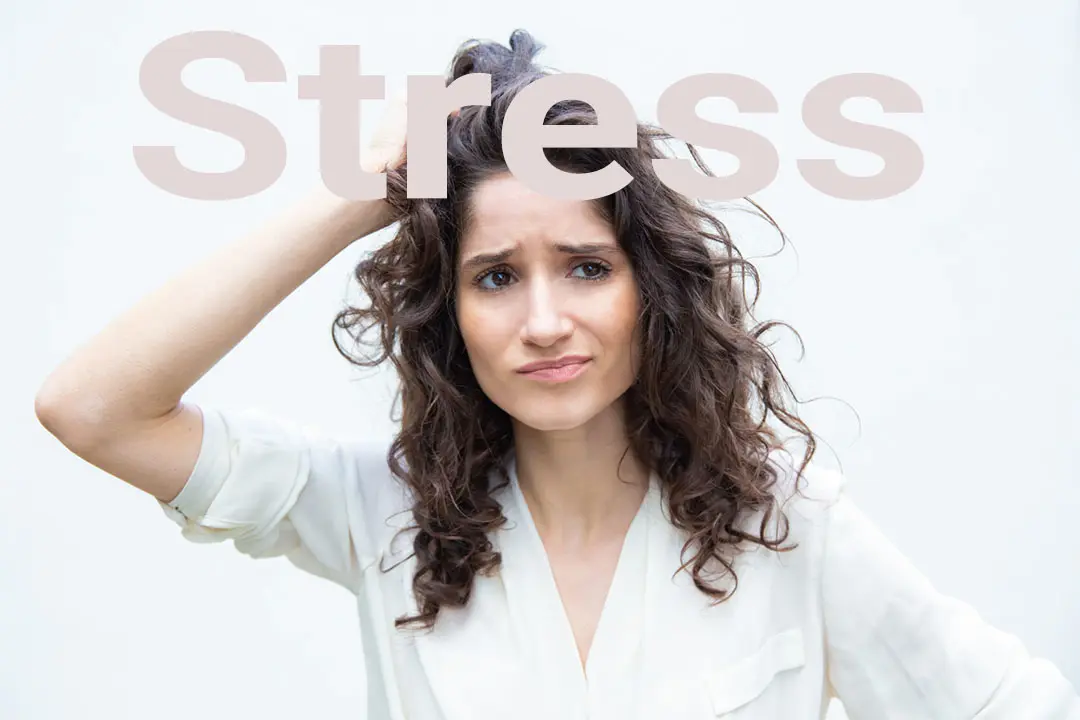Stress causes hair loss due to several biological and psychological factors that disrupt the normal hair growth cycle. In this article, we going to break down why it happens.
1. Disruption of the Hair Growth Cycle
Hair grows in three main phases.
- Growth phase(Anagon)
- Transiton phase(Catagen)
- Resting/shedding phase(Telogen)

When you are under stress, especially during an intense moment, it can push more hairs into the telogen phase, leading to excessive shedding. This condition is called Telogen Effluvium.
Most common stress-related hair loss. Happens 2-3 months after a stressful event like surgery, childbirth, or emotional trauma. This is temporary, and hair regrows over time.
2. Hormonal Response
Stress triggers the release of cortisol, the stress hormone. High cortisol levels can:
- Disrupt the normal function of hair follicles.
- Lead to inflammation, which affects hair growth.
- Interfere with the production of necessary hormones for healthy hair.
3. Poor Nutrition
Stress often leads to poor eating habits or nutrient absorption, causing deficiencies in:
- Iron
- Vitamin D
- B vitamins
- Protein: These are essential for hair health.
4. Autoimmune Reactions
Stress can also trigger or worsen autoimmune conditions like Alopecia Areata.
- The immune system attacks hair follicles.
- Causes patchy bald spots.
- Often linked with emotional stress.
5. Trichotillomania (Hair-Pulling Disorder)
A psychological condition where a person pulls out their hair due to stress, anxiety, or emotional distress.
Stress Causes Hair Loss: What You Can Do About It?
1. Lower Your Stress Levels
You’ve got to tackle the root cause. Here’s how:
- Mindfulness/Meditation: Even 10 minutes a day helps calm cortisol.
- Exercise: Walking, yoga, or cardio helps lower stress hormones and boosts blood flow to the scalp.
- Sleep: Aim for 7–9 hours of quality sleep. This is when your body repairs itself, including your hair.
2. Optimize Your Diet for Hair Regrowth
Stress often depletes your nutrient stores. Focus on these:

3. Use Gentle Hair Care Practices
- Avoid heat styling, tight hairstyles, or harsh treatments (bleach, relaxers).
- Use sulfate-free, gentle shampoos and hydrating conditioners.
- Try scalp massages with oils like rosemary or castor oil – increases circulation & stimulates follicles.
4. Consider Supplements (Optional but Helpful)
- Nutrafol or Viviscal (clinically backed hair supplements)
- Collagen powder (helps strengthen hair from within)
- Always check with a doctor before starting new supplements.
5. Get to the Emotional Core
If the stress is long-term (burnout, grief, anxiety, etc.), therapy can make a huge difference. Your mental health is directly tied to your physical well-being, including your hair.
6. Be Patient
- Hair Regrowth Takes Time
- You might not see visible improvement for 3–6 months.
- Take progress pics monthly to stay motivated.
- Celebrate small wins, like less shedding in the shower or a fuller ponytail.
Frequently Asked Questions (Q&A)
Q1: Will hair loss from stress grow back?
A: Yes! In most cases, hair lost due to stress (especially Telogen Effluvium) grows back within 3 to 6 months once the stress is managed and the hair growth cycle resets.
Q2: How do I know if stress is causing my hair loss?
A: If you’ve experienced a major stressor (emotional trauma, illness, surgery, etc.) within the last 2–3 months and are seeing excessive shedding, stress is a likely cause. A doctor or dermatologist can confirm this with a scalp exam or blood test.
Q3: How much hair loss is considered normal?
A: It’s normal to shed 50 to 100 hairs per day. If you’re losing more than that consistently or notice thinning or bald patches, it’s time to investigate further.
Q4: Can anxiety or panic attacks lead to hair loss?
A: Yes. Chronic anxiety and panic attacks can lead to hormonal imbalances and nutrient deficiencies, both of which can contribute to hair shedding.
Q5: Are there any home remedies for stress-related hair loss?
A: Yes. Scalp massages with coconut or rosemary oil, a nutrient-rich diet, stress management (meditation, exercise), and proper sleep all help naturally support hair regrowth.
Q6: How long does it take to see hair regrowth after reducing stress?
A: Most people start seeing baby hairs and reduced shedding within 2–4 months after stress reduction. Full regrowth may take 6–9 months or more, depending on the severity.
Conclusion
Stress causes hair loss, and you might notice more hair on your pillow or in the shower. The good news is that this type of hair loss usually goes away and can be fixed. To improve your hair health, focus on reducing stress and taking care of your body. Remember, self-care is essential, not a luxury. Your hair and your overall health will benefit from it.

